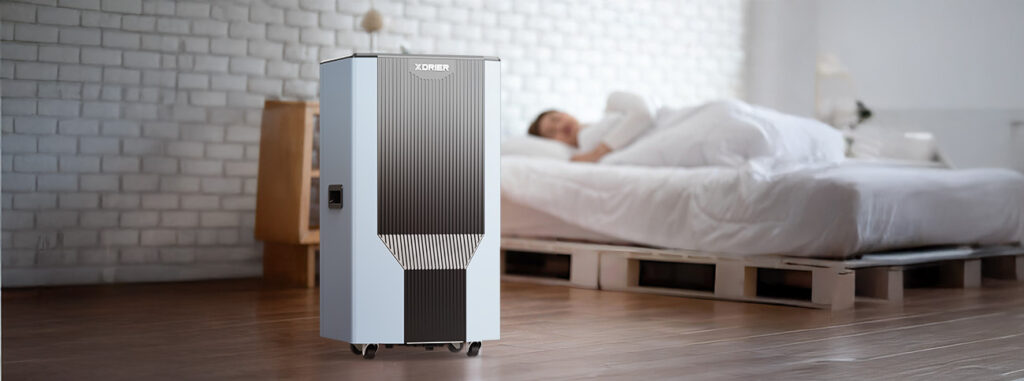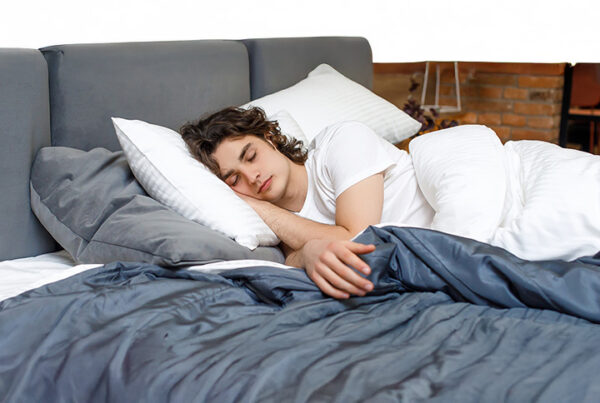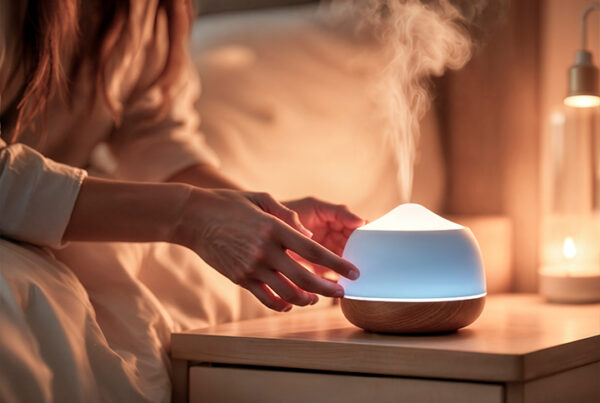The Science Behind Sleep Quality and Indoor Humidity

If you’re tossing and turning at night, humidity could be the unseen factor disrupting your sleep.
Sleep is one of the most important pillars to your overall health and well-being. When we sleep, our body restores functions that impact how we perform when awake.
The formula to healthy sleep includes: a consistent sleep schedule, the duration of sleep, and the quality of sleep. Getting enough sleep at night gives the brain and the body ample time to recover.
However, your quality of sleep is also crucial.
There are several environmental factors that can significantly impact your sleep quality. While the most common ones are noise and light, humidity also plays a direct role in your comfort and overall health.
When left unchecked, humidity can foster an environment for mold growth, allergens, and skin irritation. By understanding the relationship between humidity and sleep quality, you can create optimal sleeping conditions.

How Sleep Quality Affects Your Health
Sleep makes up four stages across a series of cycles.
On average, an individual goes through four to six sleep cycles during the course of the night. However, sleep cycles can vary from person to person depending on their sleep patterns and environment.
A typical sleep cycle will move from light sleep to deep sleep before moving into the rapid eye movement (REM) stage. Each stage is vital in restoring key bodily functions such as tissue repair, bone and muscle recovery, and immune health.
However, high humidity can increase chances of interrupted sleep which disrupts your sleep cycle. This can leave you feeling restless, fatigued, and negatively affect your health over time.

How Humidity Affects Your Sleep
High humidity occurs when there is excessive moisture in the air. This is more prominent during warmer months such as the spring and summer seasons.
When the air is humid and sticky, there is an increased tendency for the body to overheat. This makes it more prone to discomfort and sleep disturbances.
Listed below are some of the most common ways humidity can affect your sleep:
Discomfort and excessive sweating
When humidity levels are high, the body struggles to regulate its temperature efficiently.
Sweating is the body’s natural cooling mechanism. However, when the air is too moist, sweat does not evaporate effectively. This leads to excessive perspiration, discomfort, and an overall restless night.
Sleeping in humid conditions can result in waking up multiple times due to overheating, leaving you feeling tired and groggy the next day. Over time, sleep deprivation caused by discomfort can impact cognitive function, mood, and productivity.
Increased risk of mold and allergens
Humidity creates an ideal environment for mold growth, dust mites, and other allergens.
Exposure to these allergens can trigger allergic reactions, such as sneezing, congestion, and itchy skin, all of which can make it difficult to get a good night’s sleep. Mold spores in particular can cause respiratory issues and worsen conditions like asthma and sinus infections.
Additionally, high humidity can contribute to bacterial growth, leading to unpleasant odors and an overall unhealthy sleep environment.
Breathing difficulties and disturbances
High humidity can make the air feel heavy and thick, making it harder to breathe comfortably.
This is especially problematic for individuals with respiratory conditions like asthma, sleep apnea, or chronic bronchitis. Poor air circulation in a humid environment can reduce oxygen levels in the bedroom, further exacerbating breathing difficulties and lowering sleep quality.
Increased moisture in the air can also contribute to nasal congestion, leading to snoring or interrupted sleep.
The Ideal Humidity Level for Sleep
Ideally, indoor humidity levels should fall between 50 and 60% for a comfortable sleeping environment.
Levels below this range can cause dryness in the air, leading to issues like irritated skin, dry throat, and nasal congestion. On the other hand, levels above this range increase the risk of mold, allergens, and overheating.
Maintaining this optimal range can help improve sleep quality by preventing discomfort and health issues caused by extreme humidity levels.
How to Manage Humidity for Better Sleep
Maintaining an optimal humidity level in your bedroom is essential for achieving quality sleep. Here are some ways you can take control of indoor humidity:
Keep Room Ventilated
Proper airflow is crucial for maintaining balanced humidity levels in your bedroom. Without adequate ventilation, moisture can build up, leading to excessive humidity.
One way to improve ventilation is by opening windows and using exhaust fans to prevent excess moisture from seeping into your room. Additionally, avoid blocking air vents with furniture or curtains as this can disrupt airflow and lead to humidity imbalances.
Good ventilation not only helps regulate humidity but also removes airborne pollutants and allergens that can disrupt sleep.
Invest in a Dehumidifier
If your room often feels damp and uncomfortable, investing in a dehumidifier is one of the most effective solutions. Dehumidifiers work by pulling excess moisture from the air, creating a cooler and more comfortable sleeping environment.
When choosing a dehumidifier, it’s important to consider the size of the room. Opt for a model with an appropriate moisture removal capacity suitable for your space. Energy-saving features also help reduce electricity costs while maintaining effective performance. Additionally, some units come with convenient automatic settings which can simplify maintenance.
By selecting the right dehumidifier, you can effectively manage indoor moisture levels, creating a more comfortable and healthy sleeping environment.
Monitor Humidity Levels
To keep your bedroom comfortable, it’s essential to monitor humidity levels regularly.
If humidity levels exceed 60%, you may notice signs of excess moisture, such as condensation on windows, musty odors, or mold growth. This can make your room feel warm and sticky, making it difficult to fall asleep.
On the other hand, if humidity drops below 40%, the air may become too dry.
By keeping an eye on humidity levels, you can take action before discomfort sets in, ensuring a healthier sleep environment. XDRIER’s dehumidifiers come with a built-in humidity level indicator to constantly monitor your indoor humidity conditions.
Maintain an Efficient HVAC System
Your heating, ventilation, and air conditioning (HVAC) system plays a vital role in regulating indoor humidity.
To ensure your HVAC system operates efficiently, replace air filters regularly to maintain proper airflow and reduce allergens. Scheduling professional maintenance at least once a year can help detect potential issues. If your system struggles to regulate humidity, consider adding a dehumidifier to enhance its performance.
A well-maintained HVAC system can make a significant difference in controlling humidity and improving indoor air quality, ultimately promoting better sleep.
Achieving quality sleep goes beyond just getting a full night’s sleep—it’s also about creating the right environment.
Humidity has a direct impact on your comfort and overall health, making it essential to manage indoor moisture levels.
Take charge of your environment with XDRIER’s dehumidifiers today. With its powerful performance, it gives you the control you need to achieve better sleep and overall well-being.

